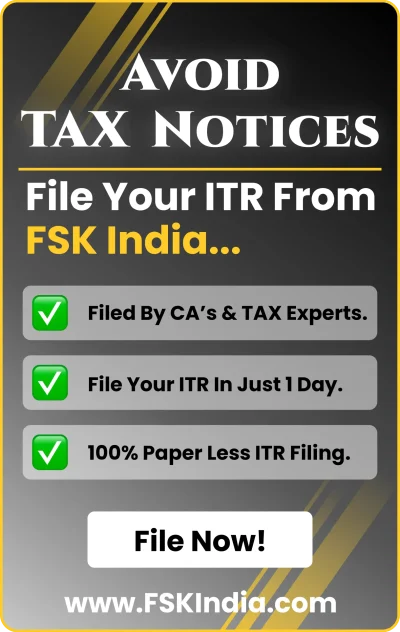
Income Tax Calendar for Last Date of ITR Filling
[A.Y. 2024-25]
Contact Us Now!
Short Term Capital Gain Tax on Shares: A Comprehensive Guide
Investing in the stock market has become increasingly popular with individuals looking to grow their wealth. However, with the potential for significant profits comes the responsibility of understanding and paying taxes on profits and gains. One important aspect of stock market taxation is the Short Term Capital Gain (STCG) tax. This article looks into the details of STCG tax on shares, helping you navigate this critical area of your financial life.
Short Term Capital Gain Tax on Shares:
Meaning of Short Term Capital Gain (STCG): Profit from selling of shares owned for a period less than 1 Year are called Short Term Capital Gain.
Tax Rate on STCG: Tax Rate on Short Term Capital Gain is Flat 15%. No basic slab and Deductions are allowed while calculation Tax on STCG.
Short Term Capital Gains Report: Short Term Capital Gains are reported in ITR 2 or ITR 3.
Short Term Capital Gains Non Reporting: Non Reporting of Shares and Mutual Funds sales in ITR can cause issue of Notice from Income Tax Department.
Calculation of STCG: Subtract the cost of purchase and any related expenses from the sale price of shares.
- Exemptions and Deductions: Limited exemptions; no deductions under Section 80C are applicable.
- Filing STCG in ITR: Must be reported in your Income Tax Return (ITR); failure to do so can result in penalties.
- Impact of STCG on Tax Liability: Adds to your taxable income, increasing your overall tax liability.
What are Short Term Capital Gains?
Short Term Capital Gains (STCG) arise when you sell shares within a short period after purchasing them. In India, this period is defined as less than 12 months. If you sell shares held for more than 12 months, the profit is considered Long Term Capital Gains (LTCG), which is taxed differently.
file your ITR hassle-Free!
Great! – With FSK India Get Your STCG Filed in Just 1 Day at ₹1,000/- only…
Tax Rate on Short Term Capital Gains
The tax rate for STCG on shares is set at a flat rate of 15%, regardless of your total income. This rate applies to gains from equity shares and equity-oriented mutual funds. It’s important to note that this tax rate is the same for all taxpayers, regardless of their income bracket.
Calculating Short Term Capital Gains Formula
To calculate your STCG, follow these steps:
Determine the Sale Price: The price at which you sold the shares.
Subtract the Cost of Acquisition: The price at which you originally purchased the shares.
Deduct Related Expenses: Include brokerage fees, Securities Transaction Tax (STT), and other charges related to the transaction.
Formula Of Calculating Short Term Capital Gains:
STCG = Sale Price − (Cost of Acquisition + Related Expenses)
For example, if you purchased shares for ₹100,000 and sold them for ₹150,000, incurring ₹5,000 in related expenses, your STCG would be:
STCG=₹150,000−(₹100,000+₹5,000)=₹45,000
How to calculate short-term capital gains?
In order to calculate your short-term capital gain, you must subtract any additional costs or expenses related to the acquisition from the sale price. The following format should be followed in order to determine your STCG accurately:
| Particulars | Amount | Amount |
| Full value of consideration | XXX | |
| Less: Expenses incurred wholly and exclusively for such transfer | (XXX) | |
| Net sale consideration | XXX | |
| Less: Cost of acquisition | (XXX) | |
| Less: Cost of improvement | (XXX) | |
| Short-term capital gains (STCG) | XXX | |
| Less: Exemptions available under section 54B/ 54D | (XXX) | |
| Short-term capital gains chargeable to tax | XXX |
Best Support Service - ever!
FSK India Gives The Best Support Service To You, While Filing Your Income TAX Return’s.
Exemptions and Deductions
Unlike other forms of income, STCG does not enjoy many exemptions or deductions. Specifically, deductions under Section 80C, which apply to investments in tax-saving instruments, do not apply to STCG. This makes it crucial for investors to plan their investments and transactions carefully.
Filing Short Term Capital Gains in ITR
Reporting STCG in your Income Tax Return (ITR) is mandatory. The process involves:
Using the Correct ITR Form: For individuals with STCG, ITR-2 or ITR-3 is typically used, depending on the nature of your income.
Detailed Disclosure: You must disclose the details of each transaction, including the date of purchase, date of sale, sale price, purchase price, and expenses incurred.
Paying the Tax: The 15% tax on STCG must be paid along with your other income tax liabilities.
Impact of Short Term Capital Gains on Tax Liability
STCG adds to your taxable income, increasing your overall tax liability. For instance, if your total income is ₹5,00,000 and you have an STCG of ₹45,000, your total taxable income becomes ₹5,45,000. This can push you into a higher tax bracket, depending on your total earnings.
Strategic Planning to Minimize STCG Tax
While STCG tax is unavoidable, strategic planning can help minimize its impact. Here are some strategies:
Timing Your Transactions: Holding shares for more than 12 months can convert STCG to LTCG, which is taxed at a lower rate of 10% beyond ₹1 lakh.
Using Losses to Offset Gains: Short-term capital losses can be used to reduce short-term capital gains, reducing your taxable STCG.
Investing in Tax-Advantaged Accounts: Consider investing through tax-advantaged accounts where applicable.
file your ITR hassle-Free!
Great! – With FSK India Get Your STCG Filed in Just 1 Day at ₹1,000/- only…
Conclusion - Short Term Capital Gain Tax on Shares
Understanding the effects of Short Term Capital Gain tax on shares is crucial for investors. It helps in compliant tax filing and strategic financial planning. Knowing the tax rates, calculation methods, and filing requirements helps manage investments and minimize tax liability.
For expert assistance in STCG and accurate tax filing, partner with TAX Filing Services. Our comprehensive ITR solutions ensure compliance and maximize your investments.
At FSK India, we specialize in providing seamless and accurate ITR filing solutions. Whether you’re dealing with short term capital gains or other tax-related matters, our expert team is here to assist you every step of the way. Contact us today to simplify your tax filing process and ensure compliance with the latest regulations.
FAQ's - Short Term Capital Gain Tax on Shares
1. Short Term Capital Gain TAX on Shares in India!
ITR 1 is for individuals with income from salaries, pensions, or one house property, and agricultural income up to ₹5,000. ITR 2 is for individuals with income from capital gains, multiple house properties, or foreign income, and those having business income not covered under ITR 1.
2. Short Term Capital Gain Tax on Shares Exemption
Short-term capital gains on shares in India generally do not qualify for exemptions. Unlike long-term capital gains, which may benefit from exemptions under specific conditions, STCG is subject to a flat 15% tax rate with limited scope for deductions. However, you can offset short-term capital losses against gains to reduce taxable income, providing some relief.
3. Income Tax on Short Term Capital Gain on Shares
Income tax on short term capital gains from shares in India is charged at a flat rate of 15%. This applies to gains made from selling equity shares and equity-oriented mutual funds held for less than 12 months. The tax must be paid irrespective of your total income. Accurate reporting of STCG in your Income Tax Return (ITR) is essential to avoid penalties.
4. What if I made loss on shares , do I need to report in return?
Yes, It is mandatory to report details of share sold and profit or loss made on shares. If you have made loss you can carry forward the loss from shares and adjust loss with next year profit and get Tax benefits in upcoming years.
Index:
• Short Term Capital Gain Tax on Shares:
• What are Short Term Capital Gains?
• Tax Rate on Short Term Capital Gains
• Calculating Short Term Capital Gains Formula
• How to calculate short-term capital gains?
• Filing Short Term Capital Gains in ITR
• Impact of Short Term Capital Gains on Tax Liability



